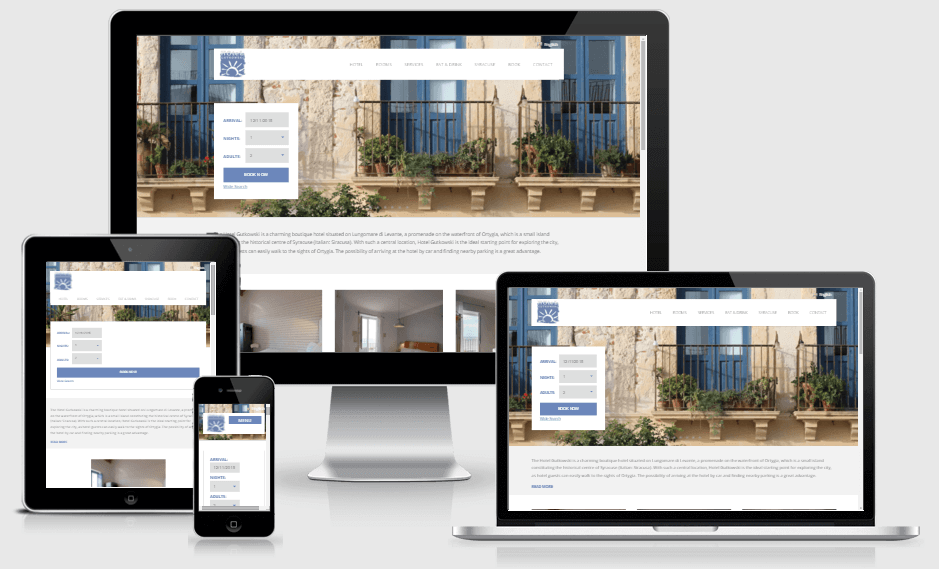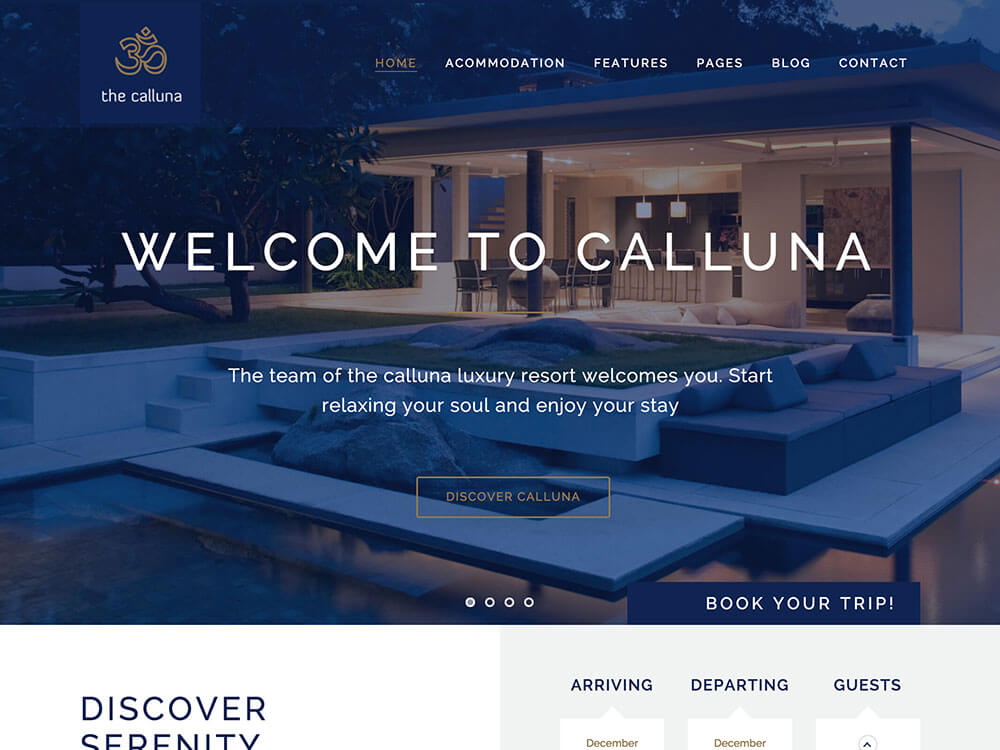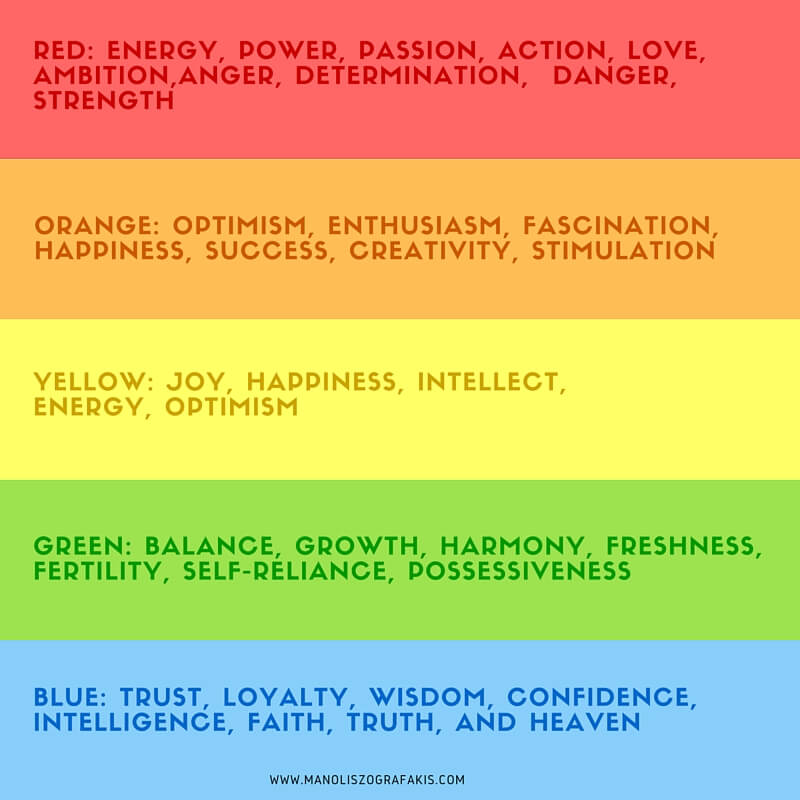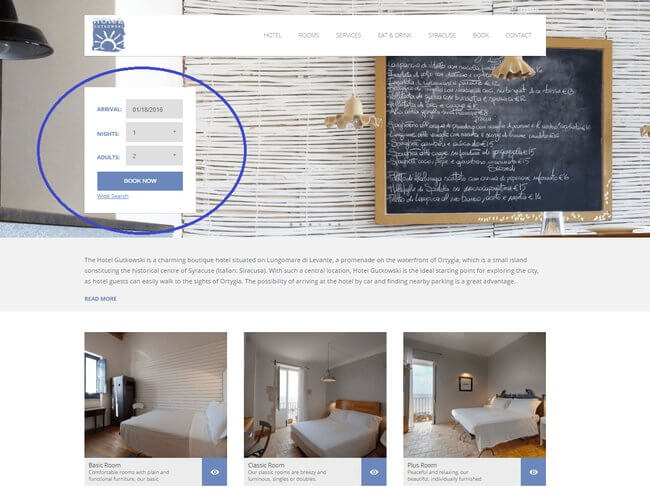Tips On Creating a Great Website for Your Boutique Hotel

It is absolutely essential for every small business to have its own website and the same applies to the hotel industry. If you’re the owner of a boutique hotel you should pay great attention on your business’ online presence – the same way you pay attention to your offline presence.
“57 % of all travel reservations made on the internet” – Statisticbrain
By having a fresh mobile-friendly website you show professionalism and respect towards your customers. However, just having a website is not enough.
Nowadays, people use the internet to find answers to their everyday problems and in the same way tourists use it for finding accommodation for their upcoming trips. Your online presence is the first impression an online user will have about your hotel. That’s why it should have an exceptional online presence, so that it rises above the competition.
Last year I visited Hotel Gutkowski, a beautiful boutique hotel in Siracusa in Sicily, Italy. First I was astonished by the hotel’s great aesthetic and atmosphere but at the same time I was surprised by its poor website. After talking with the hotel’s manager I was asked to develop their brand new website.
During that period I researched a lot about the hospitality industry and therefore I would like to share with you some thoughts, tips and advice on how to create a successful website for your boutique hotel. If you want your hotel to have an exceptional online presence you definitely need to consider the following key points:
#1 Have a responsive website
It’s a fact that there is a continuous increase of mobile usage and lots of internet experts admit that mobile is the future of everything. On May 2015, Google confirmed that it’s currently serving more Google searches on mobile than desktop computers. That means that you need a mobile-friendly website and not just an old-style website. Users are switching from desktop web browsers to smartphones and tablets continuously and the website’s user experience is extremely important for converting those visitors into actual customers.
“65 % of same day hotel reservations are made from a smartphone” – Statisticbrain
That’s why your future customers should be able to access and use your site in every type of device (PC, laptop, mobile, tablets). Moreover, Google gives great value to mobile-friendly websites and it is positioning them in a better place compared to non-mobile-friendly sites. Therefore, if you have a mobile-friendly site and your competitor doesn’t, you have a better chance of ranking in a higher position than them in google searches.
#2 Have a fast website
Having a fast-loading website is also of great importance. Speed is one of the most important Ranking Factors and that means if you have a fast-loading website you may experience better search rankings. Moreover, internet users, and especially mobile users, don’t wait too long for a page to load:
“40% of people abandon a website that takes more than 3 seconds to load” – Kissmetric
If your page takes more than 3 seconds to load you will lose visitors and therefore potential customers because according to Kissmetrics:
“A 1 second delay in page response can result in a 7% reduction in conversions” – Kissmetrics
So, all in all speed matters and that’s why your site should be fast. If you already have a website you can have a look to see how fast it is compared to other sites via gtmetrix.com or pingdom.com. If you find that your site is slow there are ways to speed it up.
#3 Have a great design that reflects your hotel’s actual design
Your boutique hotel’s site should be simple and straightforward and the aesthetic and design should be in line with the hotel’s brand identity and similar to the style of the actual hotel. For example if you have a boutique hotel you should have a fresh, well designed website that reflects the image of the actual hotel.
“46.1% of people say a website’s design is the number one criterion for discerning the credibility of the company” (Hubspot)
#4 Pay attention to the colours that you use
Another key point to consider is the palette of colours that you use in your site. The colour palette that you choose to have on your logo, site and brand visual identity as a whole are core parts of your hotel’s brand identity and that is why they are of great importance. If you already have a logo and a colour palette then you can use those colours throughout the website. However, if that’s not the case, you need to do research about the meaning of each colour before choosing the final ones.
“Research has reinforced that 60% of the time people will decide if they are attracted or not to a message – based on colour alone!” – Colourmatters
You can find some important information on choosing the right colour for each occasion here.
#5 Have an image oriented site
They say “a picture is worth a thousand words” and they are absolutely right. Users love images more than actual content. If you can present the beauty of your hotel just with some stunning images then go ahead and do it.
“90% of information transmitted to the brain is visual, and visuals are processed 60,000X faster in the brain than text.” – Zabisco
Keep in mind that you will also need good, quality text for describing your services and amenities, and for delivering your message to your clients. So the best way is to have a balance between text and image.
Tip: Don’t forget that the text is also super important for the website’s SEO (see point 7).
#6 Have call to action buttons
The “call to action” is that online element: a button, link or banner which invites the user to perform a specific action. There are various call to actions that you will normally notice in a website. Usually the call to action contains an imperative verb followed by an object (e.g.: Book a room, Book your tickets, Sign up to our newsletter, etc.).
For example, in the hotel’s case the call to action button could be implemented in the booking tool. Visitors should be able to find and use the booking tool with ease to check the availability and book directly online. I would advise you to check out some of the best hotel websites out there so that you see what kind of booking tools they use and how they have incorporated them into their websites.
Below I mention some key factors that play an important role in the success of a call to action button:
- Size
- Wording
- Colour
- Position
- Contrast with the rest of the page
Example 1 – Horizontal Booking Tool:
Example 2 – Vertical Booking Tool:
Tip: You should consider using a secure SSL page for the transaction. SSL (Secured Socket Layer) allows sensitive information such as credit card numbers and login credentials to be transmitted securely. In this way your visitors will feel safe during the whole booking process and it is more likely that they will book directly through your hotel’s website.
#7 Link to your social media
Your fans should be able to find your social media pages directly through your site. Thus, don’t forget to link to your social media channels through your header and/or footer. Find the social media buttons that better suit the whole aesthetic of your website. You can choose from rounded and rectangular to water drop and leaf style icons.
Check out some beautiful free vector social media icons to choose from.
#8 Have a Search Engine Optimisation (SEO) strategy
If you want to beat the competition you will need to have a well thought-out SEO strategy. If you have never heard of the term SEO before, it’s time to do a bit of studying… Have a look at this simple guide by Google explaining what SEO is and how to take care of it.
By taking care of your site’s SEO you make it easier for search engines such as Google, Bing and Yahoo to crawl, index and understand your content. Therefore, you will have more chances to rank well when a user searches for a hotel in your area. But how can you take care of your SEO, right? There are several search engine ranking factors and that’s why you need to have a SEO strategy.
It’s absolutely essential to do a keyword search and analysis before writing your site’s content. You will need to find the best keywords to include in your texts. For example if your hotel is situated in Barcelona, Spain you should do a keyword search to find the most important and highly used keywords that internet users use when they search for boutique hotel accommodation in Barcelona. Then use these combinations in webmaster tools to find out suggestions of important keywords according to search volume and competence. Check out how to do a keywords search in webmaster tools.
Tip: If your content is in more than 1 language then you should do different keyword searches and analysis for each language.
#9 Take care of your site’s onsite SEO
You will then need to take care of the basic onsite SEO factors such as having optimised titles and meta descriptions, proper use of headers (H1, H2 and so on), optimised images, an xml sitemap and more. Below I have mentioned some important things to remember:
- SEO is extremely important but never put SEO before user experience
- Create great, useful, relevant content keeping users in mind
- Use optimized title tags and Meta descriptions
- Use optimised Headers: H1 tags, H2 tags and so on
- Don’t forget to optimise (reduce the size so that they are made for the web) your images
- Site speed matters so be sure that your website is fast enough
- URL structure matters
- Have a proper internal structure of your website
- Use breadcrumbs properly
- Do internal linking
Tip: You can check out the most important Search engine ranking factors for 2015 according to MOZ.
#10 Have an easy to find contact form
Your visitors should also be able to contact you without effort. Therefore your hotel’s contact info should be mentioned in the footer but also in the contact page which should be linked via the menu. The contact information should include: name of the hotel, address, telephone and email address. It’s also good to embed a Google map so that the visitors can check out the exact location of the hotel. Remember that if the visitors face any problems when trying to book via the booking form, they should be able to contact you directly via email or via the phone.
Tip 1: The best free contact form plugin for WordPress is Contact Form 7.
Tip 2: If you have a 24/7 receptionist you may consider adding a live chat where users can ask questions.
#11 Have all the important sections a hotel’s website should have
There are some specific sections and information that you should definitely include in your site. You should have general info about your hotel, the rooms, the amenities, the various services you may offer, how to book and how to contact you. Here are some pages you should include:
- Hotel
- Rooms
- Services
- Book
- Contact
#12 Have the site translated to at least 2 languages
If your hotel is situated in a non-English speaking country, you should consider creating your website in the native language, but also in English. If a big percentage of your online reservations come from a specific country (for example, Italy, Spain or Germany), you should also consider translating your content in that language too.
By translating your content you can increase your online visitors and thus the potential of direct bookings.
You could use Google Translate or a plugin to do the translation but it will not be accurate and will have a lot of mistakes. Having a bad translation can look unprofessional and in some cases it may even discourage your foreign visitors to book with your hotel. Therefore, I advise you pay a professional translator to do the job for you.
Tip: Beware that, if you translate your website in various languages you may give fake expectations to your potential customers, as they will expect that your staff speak their language and they may be very disappointed when they find out the opposite.
#13 Have a Blog
Having a blog and posting fresh, unique content every now and then is the key to differ from the competition. Useful content matters and visitors will appreciate your exclusive insider information and tips. Your blog posts should always have a strong, unique style and personal feel that inspires customers to visit your area and book with your boutique hotel.
It may feature blog posts and videos about the area’s history and culture, the nightlife, the local cafes and restaurants, the beaches (if any) and any other useful information that visitors might look for. If you pay close attention to your customer’s questions at the reception of your hotel regarding the city life you may end up with some great content ideas! Remember to include in your blog posts some stunning photos of the hotel and the area so that you highlight their beauty. Finally, make sure your content is credible travel journalism and that you never over promise what customers should expect when they visit your hotel or the area as a whole. You can find some useful tips on how to write a blog post here.
Tip: Include one or two call to action phrases inside your text, and guide the customer towards a booking with internal links to deeper content and product pages.
Congrats! You now know exactly what you have to do in order to create a great website for your boutique hotel!
Get in touch to discuss about how I can help you built a modern responsive website for your boutique hotel so that you stand out from the crowd.











